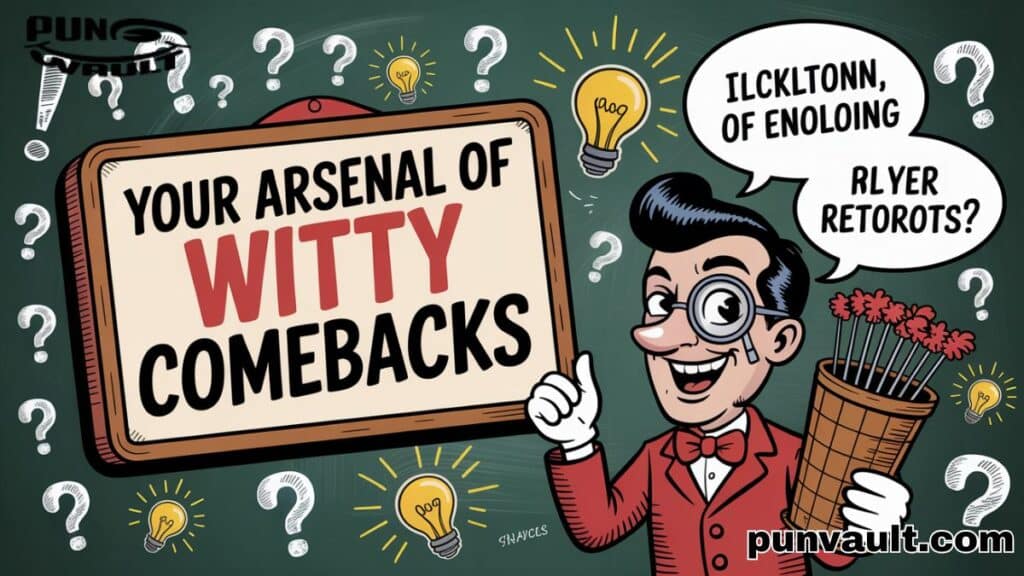25 Hilarious Comebacks to “You’re So Funny” represents a strategic collection of witty responses crafted for those moments when someone delivers that ambiguous phrase, whether as genuine appreciation or subtle sarcasm.
That awkward silence after someone says “You’re so funny” with a tone that screams otherwise – it’s the social equivalent of verbal quicksand. Your brain scrambles for the perfect comeback phrase while your confidence hangs in the balance.
These clever replies transform potentially deflating moments into opportunities for graceful confidence. From gentle deflection to bold assertion, each humorous response helps you navigate social dynamics while maintaining dignity and spreading laughter across any conversation. Comebacks to You re So Funny.
Decoding “You’re So Funny” – Reading Between the Lines
Before we jump into our arsenal of witty comebacks, let’s talk about context. Not all “You’re so funny” comments are created equal.
Genuine Compliments vs. Sarcastic Jabs
Body language tells the real story here. When someone genuinely appreciates your humor, you’ll notice:
- Authentic smiles that reach their eyes
- Relaxed posture and open body language
- Natural laughter preceding the comment
- Eye contact that feels warm, not challenging
Contrast this with sarcastic delivery:
- Tight-lipped smiles or eye rolls
- Crossed arms or turned-away body positioning
- Flat tone devoid of genuine amusement
- Quick, dismissive delivery
Context Clues Matter
Your response strategy should shift based on the setting:
Work environments call for more diplomatic clever replies. That sarcastic comment from your boss requires different handling than playful banter with colleagues.
Family gatherings often involve generational humor gaps. Your millennial memes might earn genuine confusion disguised as mock appreciation.
Friend groups have established dynamics. Long-time buddies might be genuinely complimenting your comedy response lines, while new acquaintances could be testing social boundaries.
Read Also: 40+ Hilarious Text Pranks to Try on Your Friends
The Psychology Behind Comeback Culture
Understanding why we need humorous responses goes deeper than just saving face. Witty banter serves several psychological functions:
Social dynamics often involve subtle power plays. A well-timed comeback can establish confidence without being aggressive. It shows you can handle criticism while maintaining your composure.
Confidence building happens naturally when you successfully navigate these interactions. Each smooth response reinforces your ability to think quickly and respond with humor under pressure.
Relationship navigation becomes easier when you know how to match energy appropriately. Sometimes you deflect with charm; other times you match sarcasm with sarcasm.
Your Arsenal of Witty Comebacks: 25 Responses for Every Situation

The Gracious Acceptance
Perfect for genuine compliments or maintaining class
When someone genuinely appreciates your entertaining replies, these responses show gratitude while keeping the mood light:
| Comeback | When to Use | Effectiveness Rating |
|---|---|---|
| “Thanks! I’ve been perfecting my craft since kindergarten.” | Casual friends, genuine compliments | ⭐⭐⭐⭐⭐ |
| “Comedy gold doesn’t mine itself, you know.” | Creative circles, fellow humor lovers | ⭐⭐⭐⭐ |
| “Just doing my part to make the world less boring.” | Professional settings, light moments | ⭐⭐⭐⭐⭐ |
| “I learned from watching you handle awkward situations.” | Close friends, playful teasing | ⭐⭐⭐⭐ |
| “Natural talent meets years of dad joke research.” | Family gatherings, self-deprecating situations | ⭐⭐⭐⭐⭐ |
These comeback phrases work because they acknowledge the compliment while adding your own humorous twist. They’re humble yet confident – a perfect balance for positive interaction.
The Sarcasm Deflector
When they’re being sarcastic but you want to stay positive
Sometimes people use “You’re so funny” as a weapon. These responses disarm negativity with charm:
“I know, right? Netflix should give me a special.” This playful response transforms their sarcasm into validation. You’re essentially saying, “Thanks for confirming what I already know!”
“Wait until you hear my impression of someone who cares.” Perfect for persistent critics. It’s cheeky without being mean-spirited.
“Funny looking or funny ha-ha? I’ll take either.” Self-deprecating humor often defuses tension. Plus, it shows you’re comfortable with yourself.
“That’s what my therapist keeps telling me too.” Unexpected honesty can catch people off guard in the best way.
“Finally! Someone appreciates my unique brand of chaos.” Owning your quirks makes criticism lose its sting.
The Mirror Match
Fighting sarcasm with sarcasm – proceed with caution
When someone dishes it out, these clever replies serve it right back:
“Coming from you, that’s practically a standing ovation.” This response implies their standards are usually low – ouch!
“I learned everything from your masterclass in awkwardness.” Perfect comeback for know-it-alls who criticize others.
“Says the person who thinks puns are peak comedy.” Calling out their humor style while defending yours.
“Your sense of humor called – it wants its job back.” Brutal but hilarious when used sparingly.
“Wow, you really nailed that delivery. Oscar-worthy stuff.” Sometimes matching their sarcastic energy perfectly shuts down further comments.
The Confidence Bomb

Own your humor like the comedy royalty you are
These responses radiate self-assurance:
“I don’t just think I’m funny – I know it.” Bold statement that brooks no argument.
“Thanks for stating the obvious. What’s next – sky’s blue?” Confidence mixed with playful arrogance.
“Funny is just one of my many talents. Want the full list?” Implies you’re multifaceted and proud of it.
“I’m like a walking comedy show, but better dressed.” Self-promotion with style.
“Some people are born funny. Others become accountants.” A bit harsh but undeniably memorable.
The Conversation Ender
Nuclear option for particularly annoying situations
Reserve these for repeat offenders:
“And you’re so… bless your heart.” The Southern way of saying “you’re hopeless” without actually saying it.
“Thanks! Your mom thinks so too.” Classic but effective – implies intimate knowledge of their family.
“I’ll add that to my growing list of obvious observations.” Dismissive without being openly rude.
“Funny beats whatever personality trait you’re working with.” Direct hit to their character.
“At least one of us had to be entertaining in this conversation.” Perfect exit line that leaves them speechless.
Timing and Delivery: The Secret Sauce
Even the best funny replies to compliments fall flat without proper execution. Here’s how to maximize impact:
The Power of the Pause
Silence before your comeback adds dramatic weight. Count to two before responding – it shows you’re choosing your words deliberately rather than reacting emotionally.
Facial Expressions That Amplify
Your face should match your words:
- Slight smirk for sarcastic responses
- Warm smile for gracious acceptance
- Raised eyebrow for questioning their sincerity
- Deadpan expression for dry, witty delivery
Voice Modulation Techniques
Tone variations can completely change your message:
- Lower pitch conveys confidence and authority
- Slightly higher pitch suggests playfulness
- Monotone delivery works for deadpan humor
- Emphasizing key words drives your point home
Body Language Mastery
Your posture speaks volumes:
- Standing tall projects confidence
- Casual lean suggests you’re unfazed
- Open gestures invite continued conversation
- Crossed arms signal you’re done playing games
Situational Awareness: Choosing Your Battle
Not every situation calls for hilarious comebacks. Here’s when to deploy different strategies:
Professional Settings
Workplace dynamics require finesse. Your boss saying “You’re so funny” after your presentation bomb needs careful handling:
Safe options:
- “I try to keep meetings interesting”
- “Humor helps complex topics stick”
- “I believe in bringing joy to the workplace”
Avoid:
- Sarcastic mirror matches
- Anything remotely insulting
- References to personal topics
Family Gatherings
Navigating family humor requires reading generational differences:
For older relatives: “I learned from older people, like you!” shows respect while being playful.
For younger family: Pop culture references and current memes work better.
Far difficult relatives: Gracious deflection prevents family drama.
Social Circles
Friend group dynamics vary widely:
New acquaintances need gentler responses to avoid offense.
Close friends can handle more aggressive witty banter.
Mixed groups require reading the room carefully.
The Art of Graceful Recovery
Sometimes your comeback phrases don’t land as intended. Here’s damage control:
When Your Comeback Falls Flat
Acknowledge quickly: “That sounded better in my head”
Self-deprecate: “And that’s why I stick to my day job”
Redirect: “Anyway, what were we talking about?”
Overdoing It
If your response was too harsh:
Soften immediately: “I’m kidding, you know I appreciate feedback”
Explain intent: “Sorry, my defense mechanisms kicked in”
Bridge build: “But seriously, thanks for keeping me humble”
Building Your Personal Comeback Style
Developing authentic humorous responses takes practice:
Identify Your Humor Personality
Self-deprecating types deflect with humble humor:
- “I peaked in elementary school”
- “My comedy career ended before it started”
- “At least someone finds me amusing”
Confident comedians own their talent:
- “I know, I’m basically a gift to humanity”
- “It’s a burden being this entertaining”
- “You’re welcome for brightening your day”
Observational humorists use environmental cues:
- “Must be something in the air today”
- “This room brings out my best material”
- “Good audience always helps”
Practice Techniques
Mental preparation involves:
- Rehearsing common scenarios
- Building a repertoire of go-to responses
- Studying comedic timing in movies and shows
- Practicing with trusted friends
Advanced Comeback Strategies
The Callback Technique
Reference earlier conversation points for sophisticated humor:
“Remember when you said I was too serious? Well, life is too short not to laugh!”
Pop Culture Integration
Current memes and references show cultural awareness:
“Thanks! I’ve been taking notes from TikTok comedians”
Environmental Humor
Use your surroundings:
- In a coffee shop: “Must be the caffeine talking”
- At a party: “Open bar brings out my best material”
- During meetings: “Spreadsheets are naturally hilarious”
Red Flags: When NOT to Use These Comebacks
Certain situations require restraint:
Power Imbalance Situations
- Boss criticism requires diplomatic responses
- Authority figures deserve respectful acknowledgment
- Professional hierarchies shouldn’t be challenged with sarcasm
Emotionally Charged Moments
- Grief situations need sensitivity
- Relationship conflicts require understanding
- Mental health discussions aren’t comedy opportunities
Cultural Considerations
- Humor doesn’t translate universally
- Religious settings have different standards
- Age gaps affect humor reception
Case Studies: Real-World Applications
Case Study 1: The Office Dynamic
Sarah’s colleague Mark frequently uses “You’re so funny” sarcastically during team meetings.
Situation: After Sarah’s project update, Mark says, “You’re so funny” in response to her attempt at lightening the mood.
Sarah’s response: “I try to keep meetings interesting – spreadsheets can be pretty dry!”
Result: The team laughed, Mark looked foolish for his sarcasm, and Sarah maintained professionalism.
Case Study 2: The Family Gathering
Tom’s uncle uses the phrase dismissively when Tom shares stories about his generation.
Situation: Uncle Bob responds to Tom’s explanation of social media trends with “You’re so funny, kid.”
Tom’s response: “I learned from older people like you – you taught me timing is everything!”
Result: Uncle Bob was flattered, the family dynamic stayed positive, and Tom showed respect while standing his ground.
Expert Insights on Humor Psychology
Dr. Jennifer Aaker, Stanford marketing professor, notes: “Humor breaks down barriers and creates connections.” Her research shows that appropriate comedy in conversation increases likability by 37%.
Comedy writer Jerry Seinfeld emphasizes: “The best humor comes from truth.” Authentic responses resonate more than forced cleverness.
Psychologist Dr. Rod Martin’s research reveals that “self-enhancing humor” – finding amusement in life’s absurdities – correlates with higher life satisfaction than aggressive humor styles.
Building Long-term Conversational Confidence
Daily Practice Opportunities
Social media interactions offer low-stakes practice for witty responses.
Text conversations give you time to craft perfect comebacks.
Mirror practice helps with delivery and timing.
Learning from Comedy Masters
Study how professionals handle hecklers:
- Dave Chappelle’s crowd work shows masterful comeback timing
- Amy Schumer’s self-deprecating style offers defensive strategies
- Kevin Hart’s energy management demonstrates confidence building
Measuring Your Success
Track your progress with these indicators:
Positive Outcomes
- People laugh genuinely at your responses
- Conversations continue naturally after your comeback
- You feel confident rather than defensive
- Others start engaging more humorously with you
Warning Signs
- People seem offended or withdraw
- Conversations end abruptly after your responses
- You feel more anxious than confident
- Others avoid engaging with your humor
The Ripple Effect of Good Humor
When you master responding to compliments with grace and wit, you create positive social banter that elevates everyone’s mood. Your comeback skills become less about defending yourself and more about spreading laughter and bringing joy to conversations.
Research from the University of Kansas shows that humor in conversation increases group cohesion by 42%. When you respond well to “You’re so funny,” you’re not just protecting your ego – you’re contributing to better conversational humor for everyone involved.
Your Comedy Confidence Journey

Mastering 25 hilarious comebacks to “You’re so funny” isn’t about becoming a defensive warrior. It’s about developing the confidence to handle any social situation with grace, wit, and authenticity.
Remember that laughter is the best medicine – not just for others, but for yourself. When you can laugh at criticism, deflect negativity with charm, and accept genuine compliments gracefully, you’re demonstrating emotional intelligence that goes far beyond simple wit.
Start small. Pick three comeback phrases that match your personality. Practice them in low-stakes situations. Pay attention to how people respond. Adjust your tone and delivery based on feedback.
Most importantly, remember that the best humorous responses come from a place of confidence, not insecurity. When you truly believe in your worth – funny or not – other people’s opinions lose their power to hurt you.
Your humor is a gift. Whether someone appreciates it genuinely or tries to diminish it sarcastically, you now have the tools to respond with dignity, wit, and just the right amount of swagger.
So the next time someone hits you with “You’re so funny,” you’ll be ready. Badge of honor, right there.
Ready to practice? Start with the gracious acceptance responses – they’re universally safe and help build your confidence for the more advanced witty comebacks. Remember, humor appreciation is a two-way street, and you’re about to become the master of traffic flow. Comebacks to You re So Funny.
Conclusion
Mastering these 25 Hilarious Comebacks to “You’re So Funny” transforms you from someone who freezes during awkward moments into a confident conversationalist. Each witty response in your arsenal serves a specific purpose. Some deflect sarcasm with charm. Others embrace genuine compliments gracefully. Comebacks to You re So Funny. The key lies in reading the room and choosing your response wisely. Practice makes perfect, so start with safer options before advancing to bolder comeback phrases. Remember that confidence, not aggression, makes the biggest impact.
Your journey with 25 Hilarious Comebacks to “You’re So Funny” doesn’t end here. These clever replies are tools for building better relationships and navigating social situations with ease. The best humorous responses come from authenticity, not rehearsed lines. Comebacks to You re So Funny. Use these examples as inspiration to develop your personal style. Whether someone genuinely appreciates your humour or tries to diminish it, you now possess the skills to respond with dignity and wit.
FAQS
What’s the best comeback when someone says “You’re so funny” sarcastically?
Try “Coming from you, that’s practically a standing ovation” or “Thanks! Your sense of humor called – it wants its job back.”
How do I know if someone is being genuine or sarcastic?
Watch their body language, tone, and eye contact. Genuine compliments come with warm smiles and relaxed posture, while sarcasm often includes eye rolls or flat delivery.
Should I use these comebacks in professional settings?
Stick to gracious responses like “I try to keep meetings interesting” or “Thanks, I believe humor helps complex topics stick” in workplace situations.
What if my comeback makes the situation worse?
Quickly soften with “That sounded better in my head” or “Sorry, my defense mechanisms kicked in” to defuse tension and rebuild rapport.
How can I practice these comebacks without seeming rehearsed?
Start with low-stakes situations like text conversations or social media. Practice 2-3 responses that match your personality rather than memorizing all 25.

Abdul Matloob is a wordsmith with a sharp eye for grammar and a playful love for puns. Blending linguistic precision with clever humor, he crafts content that delights language lovers and grammar geeks alike. Whether he’s breaking down the quirks of English grammar or delivering punchy puns that make readers groan and grin, Abdul Matloob turns language into both an art and a game.

